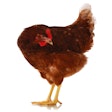
Legislation has been introduced that would expand indemnity payments in cases of highly pathogenic avian influenza (HPAI).
U.S. Sens. Chris Coons, D-Delaware, and Roger Wicker, R-Mississippi, co-chairs of the Senate Chicken Caucus, introduced the Healthy Poultry Assistance and Indemnification Act along with 11 co-sponsors in the Senate.
If the bipartisan bill is passed, it would expand the United States Department of Agriculture (USDA) Animal and Plant Health Inspection Service (APHIS) compensation program to all poultry growers and layer operations within an avian influenza control area, rather than only those whose flocks are affected.
According to a press release from Coons’ office, under current APHIS policies, all poultry farms located within 10-kilometer radius of a HPAI case are disallowed from placing flocks until the virus is contained. Afterward, all growers who have positive tests in their flocks receive compensation from the USDA, but not those within the 10-kilometer control area whose flocks don’t contract HPAI. As a result, while these growers undergo many of the same financial struggles as those whose flocks contract the virus, they aren’t compensated for their compliance with efforts to help contain HPAI. This bill would rectify that so all growers in the control area are duly compensated.
Specifically, the HPAI Act would:
- Expand USDA-APHIS compensation to all poultry farmers in an HPAI control area --The program currently only compensates farmers whose flocks test positive, not those in the control area who are disallowed from placing flocks until the virus is contained, which sometimes takes months.
- Simplify the calculation of indemnity -- The payments to farmers will be calculated based on the average income they earned from the last five flocks. This method is more transparent and ensures that farmers will not face a cash shortfall in the face of an HPAI outbreak in their area.
“Delaware has the largest per capita chicken industry in the country, and Delaware’s independent family farmers and poultry growers are all too aware of the harm avian flu can cause after last year’s outbreak,” Coons stated. “This bipartisan bill would ensure that every farmer who does their part to contain an outbreak is fairly compensated for their financial harm, and it simplifies the compensation process so farmers can get back on their feet quickly after losing their flock. As Co-Chair of the Senate Chicken Caucus, I urge my colleagues to support this bill that will ensure a robust poultry supply chain, keep food costs low, and assist our hardworking farmers.”
“As every farmer knows, unexpected events can take a heavy toll,” Wicker added. “Recent avian flu outbreaks hurt poultry growers and layers, and control areas made it harder for them to recover. This legislation would compensate workers in affected zones so they can get back to producing quickly.”
Last year, the American poultry industry was hit with its worst-ever HPAI outbreak. The outbreak affected 47 states and caused hundreds of millions of dollars in losses to poultry growers and layer operations. While fewer cases of HPAI have been confirmed in 2023, the threat remains as the virus remains active in wild bird populations.
Co-sponsors of the bill are Sens. Ben Cardin, D-Maryland; Bob Casey, D-Pennsylvania; Tom Cotton, R-Arkansas; John Fetterman, D-Pennsylvania; Lindsey Graham, R-South Carolina; Jon Ossoff, D-Georgia; Pete Ricketts, R-Nebraska; Tina Smith, D-Minnesota; Thom Tillis, R-North Carolina; Tommy Tuberville, R-Alabama; and Chris Van Hollen, D-Maryland.
This bill has been endorsed by the American Farm Bureau Federation, National Chicken Council, United Egg Producers, Delmarva Chicken Association, Delaware Department of Agriculture, Delta Council, Delaware Farm Bureau, Mississippi Farm Bureau, Maryland Farm Bureau, South Carolina Farm Bureau, Iowa Farm Bureau, Louisiana Farm Bureau, Michigan Farm Bureau, Georgia Farm Bureau, Pennsylvania Farm Bureau, Nebraska Farm Bureau, Oklahoma Farm Bureau, Virginia Farm Bureau, Minnesota Farm Bureau, North Carolina Farm Bureau, Missouri Farm Bureau, Tennessee Farm Bureau, Alabama Farm Bureau, Indiana Farm Bureau.



















